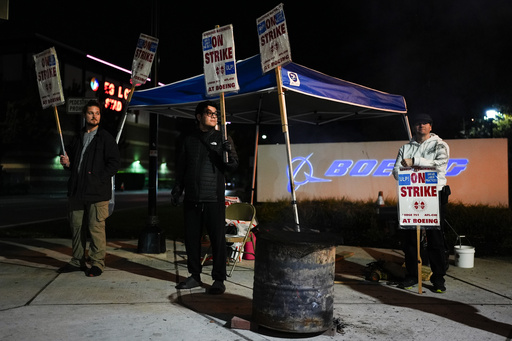
Unionized workers at Boeing are set to cast their votes on Monday regarding a new contract proposal that could either mark the end of a lengthy strike or prolong their work stoppage, which has now persisted for over seven weeks, leading to the halt of most Boeing passenger aircraft production.
Should the workers agree to ratify the contract, Boeing may be able to resume its airplane manufacturing and regain essential revenue streams. A decision to reject the offer for a third time, however, could push the corporation into deeper financial trouble and instability.
The latest contract proposition from Boeing outlines a pay increase of 38% over a four-year period, in addition to bonuses tied to ratification and productivity. The International Association of Machinists and Aerospace Workers (IAM) District 751 has endorsed this new proposal, which is considered slightly more favorable than a previous offer that had been turned down about two weeks ago.
“It’s time for our members to secure these achievements and celebrate our success,” stated the union district as they prepared for Monday’s voting. They emphasized that extending the strike would be unjust given the progress they have made.
Union representatives believe they have negotiated as much as possible and fear that future offers from Boeing could be less favorable if the current one is rejected. The outcome of the vote is expected to be revealed on Monday evening.
Notably, Boeing has continuously dismissed calls to reinstate traditional pensions that were frozen nearly ten years ago, a factor that significantly influenced workers’ decisions to decline prior offers in September and October.
If the workers decide to accept the new deal, they are anticipated to return to their jobs by November 12, according to the union.
The strike commenced on September 13 when an overwhelming 94.6% of workers rejected Boeing’s initial offer to raise salaries by 25% across four years, which fell short of the union’s original demand for a 40% increase over three years.
A subsequent offer of a 35% wage increase over four years also faced rejection on October 23, coinciding with Boeing’s announcement of a third-quarter loss exceeding $6 billion. However, this proposal saw a 36% approval, a notable increase from the 5% support the earlier offer garnered, suggesting that the company might be nearing a potential agreement.
Currently, Boeing states that the average yearly salary for machinists sits at around $75,608, a figure that would escalate to $119,309 over the next four years under the latest contract proposal.
This latest offer also introduces an improved contract ratification bonus of $12,000, compared to $7,000 included in the prior offer, alongside increased company contributions to employees’ 401(k) retirement plans.
Boeing has also committed to producing its next airline model in the Seattle area, with union representatives expressing concerns that this promise may be retracted should workers choose to turn down the new contract offer.
The ongoing strike has also caught the interest of federal authorities, with acting Labor Secretary Julie Su engaging in negotiations multiple times, including recent discussions from last week.
This labor dispute is historic as it marks the first strike involving Boeing machinists since an eight-week strike back in 2008, and it comes amid additional challenges for the company throughout a tumultuous year. Boeing has faced multiple federal investigations following an incident early this year in which a door plug dislodged from a 737 Max aircraft during a flight, causing federal regulators to impose production restrictions until they are sufficiently reassured of safety at the company.
The prior troubles surrounding the 737 Max flight model, which was involved in two fatal crashes in 2018 and 2019, have reignited concerns about its safety. A former CEO, who was unable to turn the company around, recently announced his departure from the role. Just a few months ago, Boeing agreed to plead guilty to conspiracy to commit fraud for misleading regulators.
As the strike continues, new CEO Kelly Ortberg has disclosed plans for approximately 17,000 layoffs and the intention to sell stock in order to maintain the company’s credit rating, with S&P and Fitch Ratings indicating that the $24.3 billion raised through stock and securities sales would help manage impending debt obligations and avert a potential downgrade of the company’s credit rating.
The strike has had significant financial implications for Boeing by depriving the company of the income generated from delivering new aircraft to airline customers. The work stoppage at the Seattle-area factories has interrupted production of the 737 Max—the company’s most popular model—as well as the 777 and the cargo variant of the 767.
Ortberg has acknowledged issues surrounding trust in Boeing, the heavy burden of debt, and substantial performance shortcomings that have frustrated airline clients. Nevertheless, he remains optimistic about the company’s strengths, which include a substantial backlog of aircraft orders valued at approximately half a trillion dollars.
